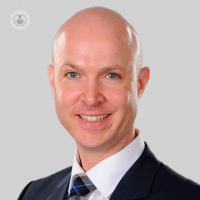An expert's explanation of the causes of hearing loss
Written by:Hearing loss is a condition that affects many of us as we get older, and can sometimes strike when we are quite young as well. In his latest article, renowned ENT specialist Professor Owen Judd explains the different types of hearing loss, what can cause hearing loss and how it can be treated.

What is the structure of the ear?
The ear is made up of three parts.
- The outer ear, which contains the ear canal and the eardrum.
- The middle ear, which is the space behind the eardrum, contains the little bones of hearing.
- The inner ear, which is buried within the bone contains the organ of hearing, or the cochlear.
How do our ears work?
Sound is transmitted along the ear canal, having been collected by the outer ear. This sound then hits the eardrum, which vibrates, and that in turn will vibrate the small bones of hearing. These bones then amplify the sound, which is delivered to the cochlear. The cochlear then converts that sound wave energy into electrical signals, which the brain then perceives as sound.

What can cause hearing loss?
Any problem with the pathway explained above can lead to hearing loss.
One problem is conductive hearing loss. This is when sound is impeded from travelling along the ear canal, or if there are problems with the vibration of the eardrum, or the little bones of hearing. This can be caused by blockage of the ear canal, for example from wax impaction, or infection.
Conductive hearing loss can also occur if the eardrum doesn’t vibrate normally. This could be due to perforation or inflammation. Hearing loss could also come from problems with the middle ear space, such as a buildup of fluid, infection or the little bones of hearing not vibrating normally.
Another type of hearing loss is sensorineural hearing loss. This commonly happens as we get older. Sound waves may arrive perfectly normally at the cochlear, (the organ of hearing) but the cochlear can begin to fail. This is quite normal as we get older, but it can happen at an earlier age due to things like viral infections, inflammation, and trauma.

How is the type of hearing loss diagnosed?
Firstly, we need to decide whether a patient has conductive hearing loss or sensorineural hearing loss. And this will be done with a hearing test.
Assuming we now know what type of hearing loss it is by examining the patient, we can then ascertain whereabouts the problem is. So is the problem with the conduction of sound from outside the eardrum, i.e., a problem with the ear canal itself?
Simple things such as significant wax impaction can cause such a conductive loss. Could this be a problem with the eardrum, the middle ear space or the vibration of the little bones? We can find this out by examining the patient and doing further tests.
Ultimately, if we can identify what is causing the conductive hearing loss, medication or surgical treatment can be instigated to help improve the sound conduction to the cochlear.
If the conductive apparatus is working normally, and the problem is to do with the cochlear itself, it is sensorineural hearing loss. This may need to be treated with hearing aids to amplify the sound getting to the cochlear, or occasionally can be treated with medication or other surgical treatments. In rare circumstances, implantable hearing aids may be recommended.
If you are concerned about hearing loss or any other ear condition, you can book a consultation with Professor Owen Judd via his Top Doctors profile.


